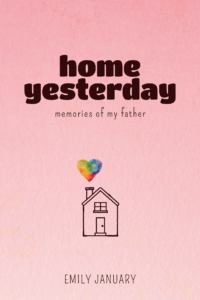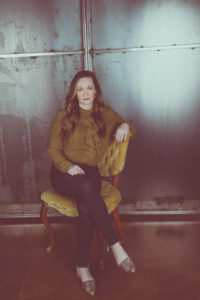 Emily January gives some background to the writing of her memoir, Home Yesterday: Memories of my Father, published this week by BCC Press.
Emily January gives some background to the writing of her memoir, Home Yesterday: Memories of my Father, published this week by BCC Press.
I carried a secret with me for most of my childhood, and it took a toll on the way I viewed myself and the world. The secret was that my dad is gay, and while my mom’s intentions were mostly good in telling me to keep it quiet, I’ve learned that speaking up about it and the effects that Mormon ideologies had on my psyche as a child with a gay parent has been therapeutic and freeing.
I once heard somebody say about me that I “like” talking about trauma. I don’t think that’s true. I would reframe it as a liberation: talking about trauma and locating the actual source of the trauma has been healing. As a child, I thought my trauma was caused by my dad being gay; I’ve learned that the actual trauma came from attitudes about what it meant to be gay. It was the 1980s and 90s, which made those attitudes a bit more intense than they are today. And yet, those attitudes persist.
I was hearing messages at church about how gay people will go to hell or that they chose the lifestyle, at the expense of their families. I also heard that gay people were not to be trusted around children, or that gayness was caused by a bad childhood or a lack of a father figure or an overbearing mother. As a kid, I heard all of these ideas and couldn’t help but try to make sense of them as they related to my own situation. Some of these ideas were easy to reject: my dad was a great parent and I was totally safe around him; therefore, of course gay people could be trusted around children! However, other ideas were scary to me. Would my dad go to hell? Was he choosing this lifestyle over the church or his children? Would I be gay too, since my childhood involved divorce, a step family, and many moves? Plus, I looked just like my dad and was constantly told that I was a “carbon copy” of him. What exactly were the implications of that?
My story isn’t only about what it was like to be Mormon and grow up with a gay father. It is also about the difficulties of maintaining a relationship with my mother, whom we think has a personality disorder. Mother-daughter relationships can be fraught, and during my teenage years, my mother became increasingly difficult to relate to and communicate with. I became was bewildered and wondered how I could make things better. I learned that my achievements made her happy, but that her love was conditional. I’ve done my best to handle the tumult that this relationship has caused in my life, but has it been enough? What is my responsibility and how do I focus on my own children and avoid some of the patterns from my childhood?
I have wanted to write about my internal struggle with all of these questions for a long time. I’ve always been a writer. As a child, I wrote plays and tried to force my cousins and sisters to act them out with me. I wrote short stories and novels, leaving looseleaf paper of my writing around the house. I kept lists of names and interesting words. As a teenager, I kept daily journals and wrote terrible poetry. As a young adult, I majored in English. As a young mother, I kept a blog. And now, as a college professor, I research and write journal articles. Because writing has always been a part of how I process ideas and how I share my feelings with others, writing this memoir felt natural. I wanted to share my story and connect with others who may have similar stories. Plus, when I first read Carol Lynn Pearson’s book Goodbye, I Love You, I felt as if I was not alone anymore. If writing down my story helps others not to feel alone, then I’ve succeeded.
Excerpt:
“As I sat in the audience of my cousin’s wedding, my husband and daughter on one side of me, my dad on the other, I … called up the courage to ask my dad, ‘When did you know that you were gay?’ This was the first time I ever dared broach the subject.
“He cocked his head and nervously bounced his knees. ‘Well, right after my mission. At BYU all of my friends were dating girls, and I realized that I didn’t really want to date any girls.’
“‘So, what did you do?’ I asked eagerly, fascinated to finally get the story from him. I had no idea he had known before he had married.
“‘I went to my bishop. He told me to date anyway and get married. He said once I found the right girl and married her, everything would be okay.’
“‘So sex would cure you, huh?’ I laughed.
“He chuckled. ‘Yes, that’s what they told us in those days.’ He paused and stared ahead at nothing. He seemed far away, almost as if he were reliving the stress of his decision years ago.
“‘It doesn’t work,’ he finally said.
…
“I could see a longing in his blue-as-Paul-Newman’s eyes. He seemed to be thinking that he wished the church he’d joined at fourteen, the one that had offered such love and acceptance to begin with, would accept him once again.”
 Emily January Petersen is an assistant professor in the English department at Weber State University, where she teaches technical communication, literature, critical theory, and rhetoric courses. Her research focuses on professional identities from a feminist perspective, examining how women document their work technologically, historically, professionally, and extra-institutionally. She has conducted research in the United States, Botswana, India, and South Africa. She worked on At the Pulpit: 185 Years of Discourses by Latter-day Saint Women as a research specialist.
Emily January Petersen is an assistant professor in the English department at Weber State University, where she teaches technical communication, literature, critical theory, and rhetoric courses. Her research focuses on professional identities from a feminist perspective, examining how women document their work technologically, historically, professionally, and extra-institutionally. She has conducted research in the United States, Botswana, India, and South Africa. She worked on At the Pulpit: 185 Years of Discourses by Latter-day Saint Women as a research specialist.

Appreciate your background story.
You have a typo, it appears you edited and changed the sentence: on is superfluous.
“how women document their work on technologically, historically, professionally, and extra-institutionally.”